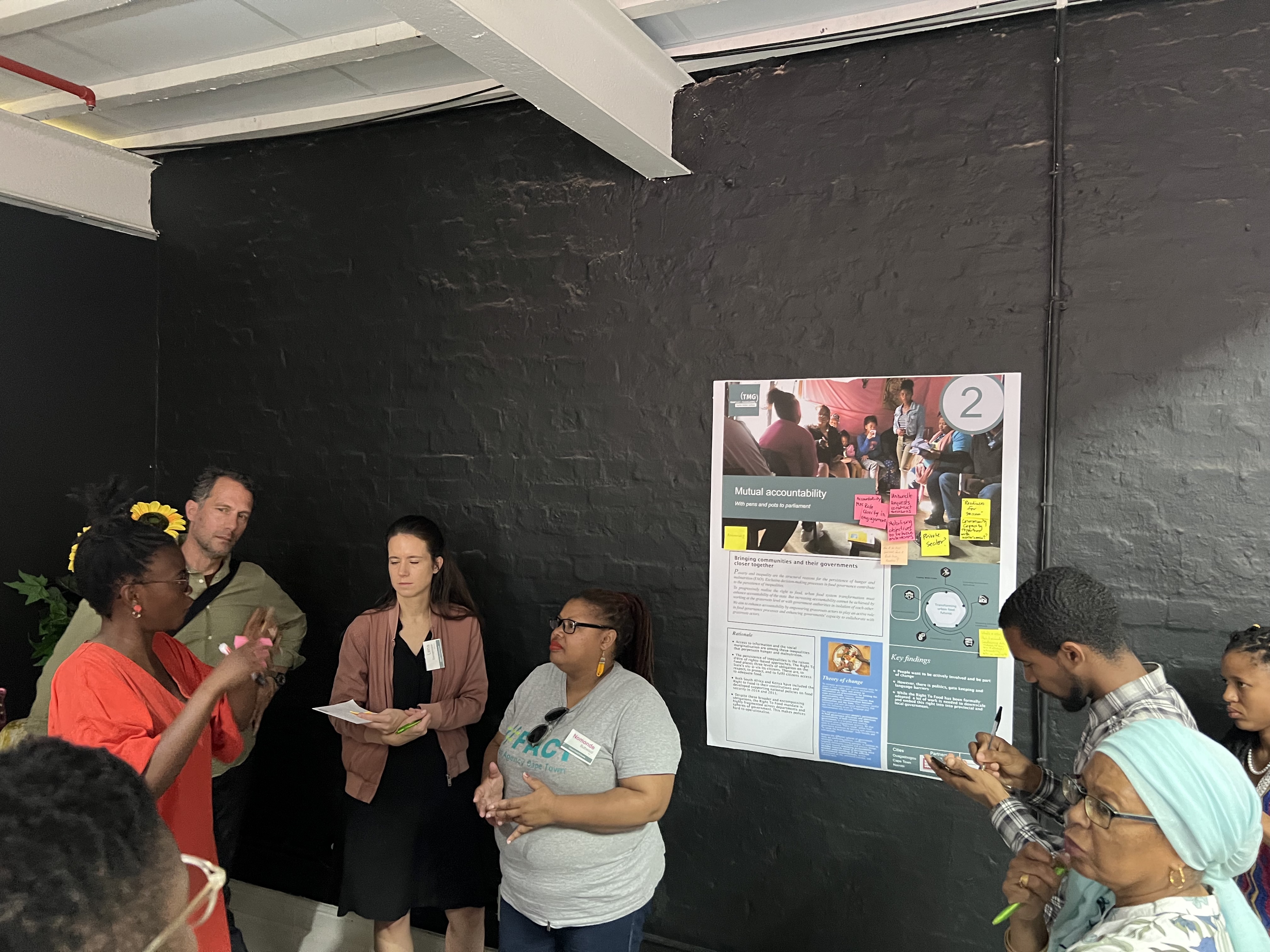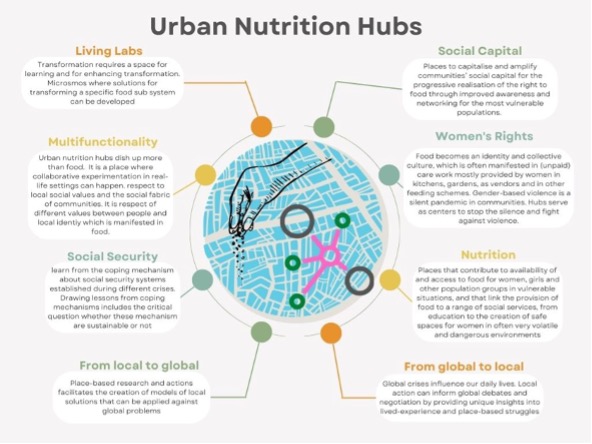Could “Urban Nutrition Hubs” offer a systemic response to entrenched hunger and inequality?
Take aways from a policy engagement event in Cape Town
by Wangu Mwangi, Luke Metelerkamp, Nicole Paganini | 2022-12-07

Food insecurity linked to rising unemployment and poverty is increasingly felt by urban households. This despite growing efforts by states to meet their constitutional obligations to progressively realize the right to food for all. As the case of Cape Town shows, however, progress on the ground remains slow and patchy. This is partly due to fragmented mandates across local, regional, and national government agencies, which makes it difficult to pin down exactly who is accountable for meeting this fundamental human right.
Building on scoping research with our partners in Cape Town, as well as related work in Nairobi and Ouagadougou, TMG Research convened a two-day policy event (18-19 November, 2022) in Cape Town to explore how to concretely address this gap. Our entry point was jointly finding ways to recognize, “valorize” and organize the considerable economic and social contributions already being made by the informal sector. This engagement with informality spanned the five research pathways around which UFF’s work has been structured, namely: Accountability, Coping Mechanisms, Informal Trade, Controlled Environment Agriculture and Crowd Sourcing Data.
The policy event brought together key partners from Cape Town (Food Agency Cape Town, Africa Centre for Cities,Southern Africa Food Lab, Heinrich Boell Foundation), public institutions (City of Cape Town, Western Cape Province, and the Western Cape Economic Development Partnership, EDP), as well as partner networks from Nairobi (Muungano Alliance, Miramar Foundation).
“What are we cooking here”?
Presenting highlights from the scoping phase of the project, Nicole Paganini, Urban Food Futures Programme Coordinator at TMG Research, emphasized that an overwhelming majority of low-income urban residents continue to perceive the state as being largely absent in spite of growing policy efforts around the Right to Food. This governance mismatch means that communities are often left on their own to cope with, and strengthen their resilience to, multiple crises and threats.
Nomonde Buthelezi and Sanelisiwe Nyaba outlined a methodology developed by the Food Agency Cape Town (FACT) – Food Dialogues - to confront the stigma of hunger and build the kind of social mobilization required to ensure that those most effected by hunger have a seat at the “policy table.” As acutely demonstrated by the Covid-19 crisis, however, “crisis means different things to different people.” This underscores the importance of contextualizing research findings, while drawing sufficiently robust policy insights to drive the needed change.
Recognizing the fragmented nature of food policy and the current challenges in governance, Tamsin Faragher (Resilience Department, City of Cape Town) and Marcela Guerrero Casas (Western Cape Economic Development Partnership - EDP) offered perspectives from a municipal and provincial governments work respectively. Both stressed the need to improve coordination and communication between state, civil society and community networks.

Learning to listen
But what does it take to translate “communication” into genuine “engagement”? While the diverse initiatives presented at the policy event aimed to shape a common understanding and “narrative” around food, inclusivity and sustainable futures, as noted by Jane Battersby, translating knowledge into (policy) action is challenging. This is particularly true of informal and low-income urban communities that are largely disconnected from formal governance structures. Given that cities are already awash with more than enough food, framing the problem as one of inadequate food production or supply without addressing systemic inequalities and exclusion will therefore not trigger the required transformations.
Highlighting insights from a joint scoping study with TMG, Gareth Haysom, Africa Centre for Cities, underscored the importance of transitioning towards governance models that are built around “food-sensitive planning.” Jane Weru added to this from a Kenyan perspective, outlining Muungano’s intentions to initiate a process of food orientated planning within the informal settles they work in. This not only requires partnerships that embody the various dimensions of urban food security (including health, education, water and energy access, and other basic services), but, as noted by Alexander Müller, TMG’s Managing Director, underscored the importance of finding new ways of tackling a global food and nutrition security crisis that manifests in different ways at the local level. Addressing the universal Right to Food, he stressed, will require learning from such local solutions and dialogues to develop the requisite normative frameworks that can “bridge the gap between local realities and global promises.”
Governing complexity
We have seen food drift on and off the agenda – it’s an exciting moment to address a perfect storm of crises and leverage the excitement and energy in the face of ongoing crises. [Jane Battersby, African Centre for Cities]
Discussing how to transition from awareness to policy change, Jes Weigelt, Head of Programmes at TMG, delved into the concept of informality as the connecting thread across many bottom-up solutions to address food insecurity. This, he explained, has informed five “urban food system transformation pathways” being pursued by TMG and partners with the ultimate aim of demonstrating how developing new ways of engaging and supporting contexts of informality can become a critical lever in securing the right to food.
Governing across scales, from local to global and global to local, begins with a sound understanding of context and the ability to translate this contextual understanding across scales. It is against this backdrop that TMG has proposed the concept of “Urban Nutrition Hubs” as place-based approach for strengthening synergies and amplifying local voices in both local and international governance processes.
We define Urban Nutrition Hubs as multi-functional spaces that build on existing local centres - such as a community kitchens - to develop and enable local efforts within the food system. Urban Nutrition Hubs will serve as living labs for social mobilization and data collection that enables local actors to engage more actively in urban food governance processes. However, as Nomonde from FACT noted, ‘food is just the doorway to a much bigger house’ and while the focus of the Urban Nutrition Hubs will be on food related transformation, the hubs will serve as multifunctional spaces which focus on other related challenges such as women’s rights, social security and youth development.

Next steps
Having undertaken an ambitious programme of research, consultation and analysis over the past two years, the policy event in Cape Town was a watershed moment for the UFF programme. The event served as the launch point for stepping into a new phase of research and implementation with partners in three very different cities. In 2023, TMG and its partners will embark on operationalization of the five pathways and begin developing Urban Nutrition Hubs in Cape Town and Nairobi as entry points for deepening our place-based engagement within the food system.
 Urban Food FuturesFeb 09, 2026
Urban Food FuturesFeb 09, 2026Pushing the horizon: Urban farming and community-led innovation in Mukuru informal settlement
A small community-run greenhouse in Mukuru is offering insights into how controlled-environment agriculture can strengthen food security in urban environments under increasing pressure—and a look into the future of food systems in informal settlements.
Christian Sonntag, Emmanuel Atamba, Lumi Youm
 Land GovernanceDec 18, 2025
Land GovernanceDec 18, 2025Land tenure, women’s land rights, and resilience: Reflections from CRIC23 toward UNCCD COP17
Our experts discuss what the exchanges at CRIC23 highlighted and revealed about the role of secure and gender-equitable land tenure in the UNCCD's work ahead of the 2026 triple COP year.
Frederike Klümper, Washe Kazungu
 Urban Food FuturesDec 09, 2025
Urban Food FuturesDec 09, 2025The story of Mukuru's Urban Nutrition Hub
In Mukuru informal settlement, a safe haven for women has grown into the Urban Nutrition Hub, a multi-purpose space for nutrition education, training, and community development, demonstrating the potential of grassroots community-owned innovation..
Serah Kiragu-Wissler


